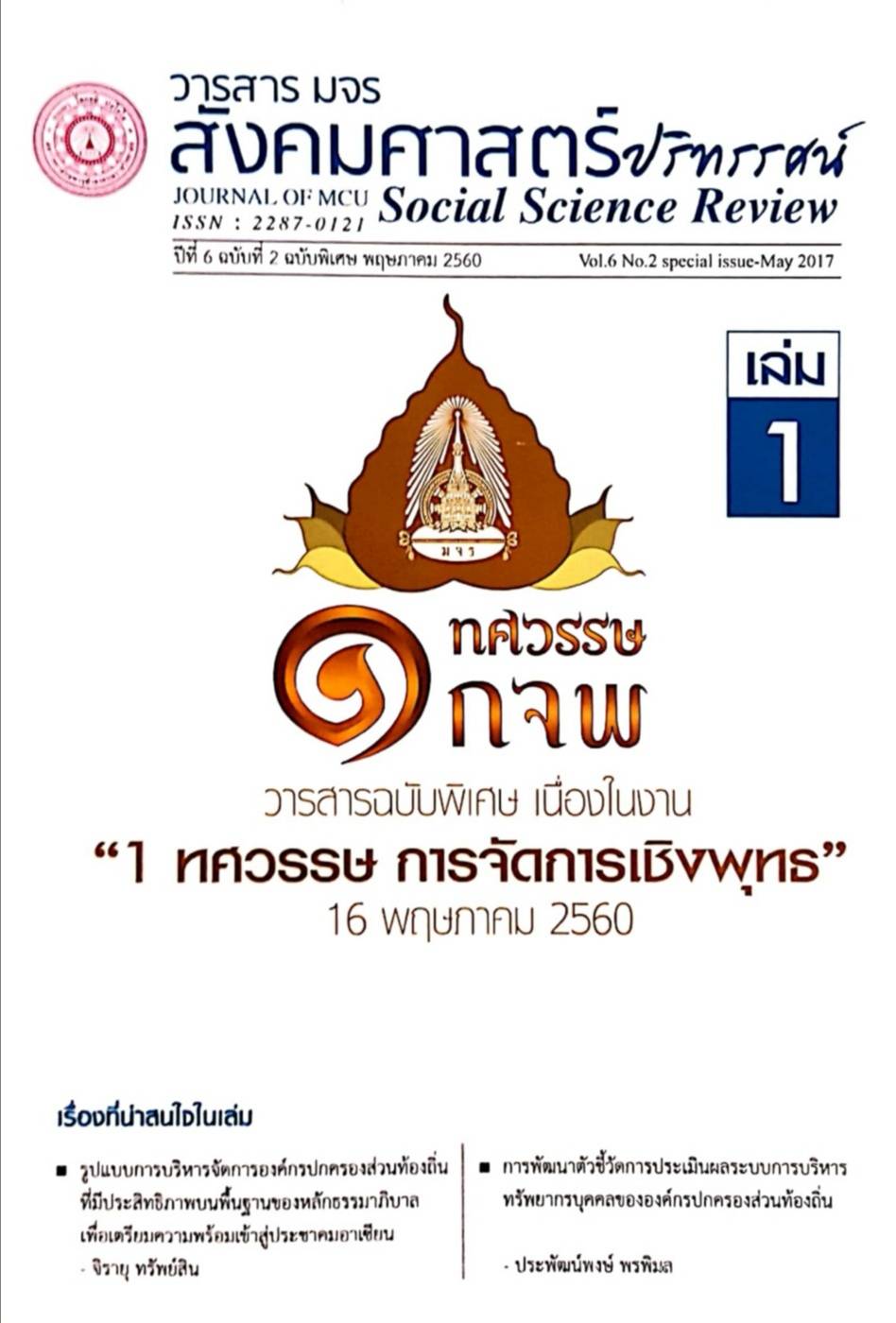ปัจจัยที่มีผลต่อการบริหารจัดการกองทุนสัจจะออมทรัพย์ เพื่อความเข้มแข็งของเศรษฐกิจชุมชน ในจังหวัดระยอง
คำสำคัญ:
ปัจจัยที่มีผล, การบริหารจัดการ, กองทุนสัจจะออมทรัพย์, ความเข้มแข็งของเศรษฐกิจ ชุมชนบทคัดย่อ
การศึกษาวิจัยเรื่อง “ปัจจัยที่มีผลต่อการบริหารจัดการกองทุนสัจจะออมทรัพย์
เพื่อความเข้มแข็งของเศรษฐกิจชุมชน ในจังหวัดระยอง” มีวัตถุประสงค์เพื่อศึกษาการบริหาร
จัดการกองทุนสัจจะออมทรัพย์เพื่อความเข้มแข็งของเศรษฐกิจชุมชน ในจังหวัดระยอง เพื่อศึกษา
ปัจจัยที่ส่งผลกระทบต่อการบริหารจัดการกองทุนสัจจะออมทรัพย์เพื่อความเข้มแข็งของเศรษฐกิจ
ชุมชน ในจังหวัดระยอง และเพื่อนาเสนอปัจจัยที่มีผลต่อการบริหารจัดการกองทุนสัจจะออมทรัพย์
เพื่อความเข้มแข็งของเศรษฐกิจชุมชน ในจังหวัดระยอง ผลการวิจัย พบว่า
ผู้ตอบแบบสอบถามส่วนใหญ่เป็นเพศหญิง มีอายุมากกว่า 31-40 ปี มีระดับการศึกษา
มัธยมตอนต้น ความเกี่ยวข้องกับกองทุนสัจจออมทรัพย์ ตาแหน่งพนักงานจ้าง รายได้เฉลี่ยต่อเดือน
5,000-10,000 บาท ระยะเวลาของการเป็นสมาชิก 1-5 ปี การบริหารจัดการกองทุนสัจจะออม
ทรัพย์เพื่อความเข้มแข็งของเศรษฐกิจชุมชน ในจังหวัดระยอง โดยรวม มีความคิดเห็นอยู่ในระดับ
มาก เมื่อพิจารณาเป็นรายด้าน พบว่า ทุกด้านมีความคิดเห็นอยู่ในระดับมาก ความเข้มแข็งของ
เศรษฐกิจชุมชนโดยรวมมีความคิดเห็นอยู่ในระดับมาก เมื่อพิจารณาเป็นรายด้าน พบว่า ทุกด้านมี
ความคิดเห็นอยู่ในระดับมาก และพบว่า การบริหารจัดการตามหลักทิฏฐธัมมิกัตถประโยชน์ 4 คือ
ธรรมที่เป็นไปเพื่อประโยชน์ปัจจุบัน โดยรวม มีความคิดเห็นอยู่ในระดับมาก เมื่อพิจารณาเป็นราย
ด้าน พบว่า ระดับความคิดเห็นมากที่สุด 1 สมชีวิตา เลี้ยงชีวิตแต่พอดี และมีความคิดเห็นอยู่ใน
ระดับมาก 3 ด้าน คือ ด้านอุฎฐานสัมปทา ขยันหมั่นเพียร ด้านกัลยาณมิตตตา คบคนดีเป็นมิตร
ด้านอารักขสัมปทา คุ้มครองรักษาทรัพย์ การบริหารจัดการตามหลักฆราวาสธรรม 4 คือ ธรรม
สาหรับฆราวาส โดยรวม มีความคิดเห็นอยู่ในระดับมาก เมื่อพิจารณาเป็นรายด้าน พบว่า มีความ
คิดเห็นอยู่ในระดับมากที่สุด 3 ด้าน คือ ด้านสัจจะ มีความจริงใจ ด้านทมะ ฝึกฝน ด้านขันติ มีความ
อดทน และด้านจาคะ มีความเสียสละ ระดับความคิดเห็นอยู่ในระดับมากผลการทดสอบสมมติฐาน ผู้ตอบแบบสอบถามที่มีปัจจัยส่วนบุคคลที่แตกต่างกันให้
ความสาคัญต่อปัจจัยที่มีผลต่อการบริหารจัดการกองทุนสัจจะออมทรัพย์เพื่อความเข้มแข็งของ
เศรษฐกิจชุมชน ในจังหวัดระยอง ที่แตกต่างกัน พบว่า ปัจจัยด้านเพศ ด้านความเกี่ยวข้องกับ
กองทุนสัจจะออมทรัพย์ ด้านรายได้ต่อเดือน ที่แตกต่างกัน ให้ความสาคัญต่อปัจจัยที่มีผลต่อการ
บริหารจัดการกองทุนสัจจะออมทรัพย์เพื่อความเข้มแข็งของเศรษฐกิจชุมชน ในจังหวัดระยอง
แตกต่างกันอย่างมีนัยสาคัญทางสถิติ 0.05 และพบว่า ปัจจัยทางด้านอายุ ระดับการศึกษา
ระยะเวลาของการเป็นสมาชิกที่แตกต่างกัน ให้ความสาคัญต่อปัจจัยที่มีผลต่อการบริหารจัดการ
กองทุนสัจจะออมทรัพย์เพื่อความเข้มแข็งของเศรษฐกิจชุมชน ในจังหวัดระยอง ที่ไม่แตกต่างกัน
อย่างไม่มีนัยสาคัญทางสถิติ ส่วนของความเข้มแข็งของเศรษฐกิจชุมชนส่งผลต่อการบริหารจัดการ
กองทุนสัจจะออมทรัพย์ เพื่อความเข้มแข็งของเศรษฐกิจชุมชน ในจังหวัดระยอง พบว่า โดยรวมอยู่
ในระดับสูง มีค่าสัมประสิทธิ์สหสัมพันธ์พหุคูณเท่ากับ .676 ซึ่งปัจจัยความเข้มแข็งของเศรษฐกิจ
ชุมชน สามารถร่วมกันทานายการบริหารจัดการกองทุนสัจจะออมทรัพย์ เพื่อความเข้มแข็งของ
เศรษฐกิจชุมชน ในจังหวัดระยอง ได้ร้อยละ 44.9 และพบว่า ปัจจัยความเข้มแข็งของเศรษฐกิจ
ชุมชน อย่างมีนัยสาคัญทางสถิติที่ระดับ 0.05 มีจานวน 2 ด้าน คือ ด้านส่งเสริมศูนย์วิชาการแบบ
เบ็ดเสร็จ ด้านส่งเสริมสื่อเพื่อสังคมและเชื่อมต่อเครือข่ายเพื่อการค้าขาย และด้านที่ไม่มีอิทธิพลต่อ
ความเข้มแข็งของเศรษฐกิจชุมชน ได้แก่ ด้านส่งเสริมการขยายตัวของเครือข่ายชุมชน ด้านปรับ
วิธีการงบประมาณและตั้งกองทุนเพื่อชุมชน ด้านการวิจัยและประเมินผล และยังพบว่า
หลักทิฏฐธัมมิกัตถประโยชน์ 4 ส่งผลต่อการบริหารจัดการกองทุนสัจจะออมทรัพย์เพื่อความเข้มแข้ง
ของเศรษฐกิจชุมชน ในจังหวัดระยอง พบว่า ปัจจัยหลักทิฏฐธัมมิกัตถประโยชน์ 4 มีอิทธิพลต่อการ
บริหารจัดการกองทุนสัจจะออมทรัพย์ โดยรวมอยู่ในระดับสูง มีค่าสัมประสิทธิ์สหสัมพันธ์พหุคูณ
เท่ากับ .611 ซึ่งปัจจัยหลักทิฏฐธัมมิกัตถประโยชน์ 4 สามารถร่วมกันทานายการบริหารจัดการ
กองทุนสัจจะออมทรัพย์ เพื่อความเข้มแข็งของเศรษฐกิจชุมชน ในจังหวัดระยอง ได้ร้อยละ 36.6
และพบว่า ปัจจัยหลักทิฏฐธัมมิกัตถประโยชน์ 4 อย่างมีนัยสาคัญทางสถิติที่ระดับ 0.05 มีจานวน
3 ด้าน คือ ด้านอุฎฐานสัมปทา ขยันหมั่นเพียร ด้านสมชีวิตา เลี้ยงชีวิตแต่พอดี ด้านกัลยาณ
มิตตตา คบคนดีเป็นมิตร และด้านที่ไม่มีอิทธิพลต่อหลักทิฏฐธัมมิกัตถประโยชน์ 4 ส่งผลต่อการ
บริหารจัดการกองทุนสัจจะออมทรัพย์ เพื่อความเข้มแข็งของเศรษฐกิจชุมชน ในจังหวัดระยอง
ได้แก่ หลักทิฏฐธัมมิกัตถประโยชน์ 4 และปัจจัยหลักฆราวาสธรรม 4 มีอิทธิพลต่อการบริหารจัดการ
กองทุนสัจจะออมทรัพย์ เพื่อความเข้มแข็งของเศรษฐกิจชุมชน ในจังหวัดระยอง โดยรวมอยู่ใน
ระดับต่า มีค่าสัมประสิทธิ์สหสัมพันธ์พหุคูณเท่ากับ .450 ซึ่งปัจจัยหลักฆราวาสธรรม 4 สามารถ
ร่วมกันทานายการบริหารจัดการกองทุนสัจจะออมทรัพย์ เพื่อความเข้มแข็งของเศรษฐกิจชุมชน ใน
จังหวัดระยอง ได้ร้อยละ 19.4
เอกสารอ้างอิง
เพื่อความเท่าเทียมกันของผู้มีอัตลักษณ์หลากหลายทางเพศ”. วิทยานิพนธ์
รัฐประศาสนศาสตรดุษฎีบัณฑิต. คณะรัฐประศาสนศาสตร์: สถาบันบัณฑิตพัฒนบริหาร
ศาสตร์.
ณัฐศรัณย์ ชุมวรฐายี. (2553). ปัจจัยพื้นฐานทางเศรษฐกิจ สังคม และการเมือง ที่มีผลต่อความ
เข้มแข็งของชุมชนจังหวัดตราด. วิทยานิพนธ์ปริญญาปรัชญาดุษฎีบัณฑิต. สาขาวิชา
สังคมศาสตร์, มหาวิทยาลัยแม่ฟูาหลวง.
ธนาชัย สุขวณิช. (2555). การบริหารจัดการกลุ่มออมทรัพย์เพื่อการผลิตในการสร้างความเข้มแข็ง
ของเศรษฐกิจชุมชนในพื้นที่ภาคกลางของประเทศไทย. วิทยานิพนธ์รัฐประศาสนศาสตร
ดุษฎีบัณฑิต. สาขาวิชารัฐประศาสนศาสตร์. บัณฑิตวิทยาลัย: มหาวิทยาลัยราชภัฏวไลย
อลงกรณ์ ในพระบรมราชูปถัมภ์.
พระสุบิน ปณีโต. (2554). สัจจะออมทรัพย์: ออมทุนสังคม. พิมพ์ครั้งที่ 3, กรุงเทพมหานคร:
สถาบันชุมชนท้องถิ่นพัฒนา.
รศ.ดร.วัชระ งามจิตรเจริญ. (2552).แนวคิดในการใช้พุทธธรรมเพื่อดาเนินการทางเศรษฐกิจในสังคม
ทุนนิยม : กรณีศึกษา. รายงานวิจัย. ศูนย์พุทธศาสน์ศึกษา จุฬาลงกรณ์มหาวิทยาลัย.
ดาวน์โหลด
เผยแพร่แล้ว
รูปแบบการอ้างอิง
ฉบับ
ประเภทบทความ
สัญญาอนุญาต
ลิขสิทธิ์ (c) 2020 วารสาร มจร สังคมศาสตร์ปริทรรศน์

อนุญาตภายใต้เงื่อนไข Creative Commons Attribution-NonCommercial-NoDerivatives 4.0 International License.
เพื่อให้เป็นไปตามกฎหมายลิขสิทธิ์ ผู้นิพนธ์ทุกท่านต้องลงลายมือชื่อในแบบฟอร์มใบมอบลิขสิทธิ์บทความให้แก่วารสารฯ พร้อมกับบทความต้นฉบับที่ได้แก้ไขครั้งสุดท้าย นอกจากนี้ ผู้นิพนธ์ทุกท่านต้องยืนยันว่าบทความต้นฉบับที่ส่งมาตีพิมพ์นั้น ได้ส่งมาตีพิมพ์เฉพาะในวารสาร มจร สังคมศาสตร์ปริทรรศน์ เพียงแห่งเดียวเท่านั้น หากมีการใช้ภาพหรือตารางหรือเนื้อหาอื่นๆ ของผู้นิพนธ์อื่นที่ปรากฏในสิ่งตีพิมพ์อื่นมาแล้ว ผู้นิพนธ์ต้องขออนุญาตเจ้าของลิขสิทธิ์ก่อน พร้อมทั้งแสดงหนังสือที่ได้รับการยินยอมต่อบรรณาธิการ ก่อนที่บทความจะได้รับการตีพิมพ์ หากไม่เป็นไปตามข้อกำหนดเบื้องต้น ทางวารสารจะถอดบทความของท่านออกโดยไม่มีข้อยกเว้นใดๆ ทั้งสิ้น





